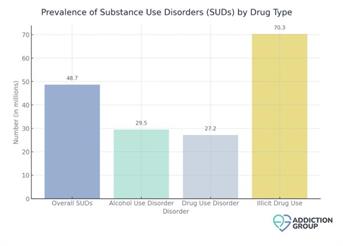Why CRC
So why is the Carbonate Recovery Center such an important addition to our community’s health and welfare? According to NAMI (National Alliance on Mental Health) - “Mental Health By the Numbers”
22.8% of U.S. adults experienced mental illness in 2021 (57.8 million people). This represents 1 in 5 adults
7.6% of U.S. adults experienced a co-occurring substance use disorder and mental illness in 2021 (19.4 million people)
Annual prevalence of mental illness among U.S. adults, by demographic group:
⦁ Hispanic or Latino: ⦁ 20.7%
⦁ Non-Hispanic White: ⦁23.9%
According to the June 12, 2024 article by ADDICTION GROUP ( Current Addiction Statistics: 2024 Data on Substance Abuse & Trends (addictiongroup.org) ), nearly 50 million Americans experienced a substance use disorder in the past year. An estimated 48.7 million Americans aged 12 or older had a substance use disorder (SUD) in the past year.
Alcohol use disorders were the most common, affecting 29.5 million people; a close second is drug use disorder (DUD), at 27.2 million people. Of those with DUD, 8 million also had an alcohol use disorder, highlighting the overlap between the two.
Another growing concern is the estimated 70.3 million people aged 12 or older using illicit drugs in the past year. Marijuana was the most common illicit drug, used by 61.9 million people (22.0% of those aged 12+). And since we know mental health issues are closely linked to SUDs, it is important treatment programs and providers focus on both to increase recovery success.
Despite the widespread need, only a tiny fraction (9.1%) of those with co-occurring mental health issues and SUDs receive treatment for both conditions. Over 70% of individuals with alcohol abuse or dependence never receive treatment, often leaving them for the judicial system to treat. Reports indicate an alarming 178,000 deaths related to alcohol abuse. Of those 178,000 deaths:
117,000 deaths are attributed to chronic conditions related to long-term alcohol use.
61,000 deaths are attributed to alcohol-related car crashes, alcohol poisoning or suicide.
Forbes Health: Mental Health Statistics released statistics in 2024 that correlate mental illness and the justice system. And because we already know substance abuse are often linked directly to mental illness, it is easy to identify where we need to start…
An estimated 2 million times each year, people with serious mental health conditions are jailed or imprisoned in the U.S. Women are disproportionately impacted at twice the rate as men. For this population, incarceration may exacerbate pre-existing symptoms, says Carolina Estevez, Psy.D., a clinical psychologist in Miami.

“Frequently, individuals who are incarcerated receive inadequate medical care and mental health treatment,” says Dr. Estevez. “This lack of access to proper care can result in conditions worsening over time.” She adds that the stigma this population faces from staff and peers may lead to further psychological distress. In fact, 63% of incarcerated individuals who have mental health conditions do not receive treatment—and for non-white individuals, their diagnoses put them at greater risk for solitary confinement, injury and longer sentencesHYPERLINK "https://www.forbes.com/health/mind/mental-health-statistics/#footnote_4"[4].
The trauma and stress associated with incarceration have a potential snowball effect, exacerbating existing conditions and potentially contributing to new diagnoses such as depression, anxiety, PTSD and substance abuse, adds Dr. Estevez. According to the National Alliance on Mental Illness (NAMI), individuals with mental health conditions are more likely to experience incarcerationHYPERLINK "https://www.forbes.com/health/mind/mental-health-statistics/#footnote_4". Additionally, those who have health care coverage following their release—and presumably, the access to mental health services that affords—may have less risk of recidivismHYPERLINK "https://www.forbes.com/health/mind/mental-health-statistics/#footnote_4".
Blaine County has an imminent need for drug and alcohol treatment, a need that has slowly increased each year since 2018. This is precisely outlined in an article in the Mountain Express on December 1, 2021, [Despite low violent crime rate, Blaine tops state in DUIs]. The article states, “In 2019 and 2020, the county averaged 8.3 DUI arrests per 1,000 residents and 192 DUI charges per year, leading the pack among all 44 Idaho counties.” Drug Court is a strategically designed treatment program that requires a commitment from an outpatient clinic to support and serve the treatment needs of the courts. That participating clinic with the Treatment Courts and substance use disorder programs must be approved by Health & Welfare and certified to provide behavioral health [substance use disorder] treatment and financially provide services below the lowest margins of insurance reimbursements. Without the relationship with an outpatient clinic and/or clinical staff, the Treatment Courts in Blaine County risk elimination and the loss of benefits delivered through such a valuable program. Making incarceration, instead of rehabilitation, the sole sentence for those convicted with a drug and/or alcohol charge.
CRC is dedicated to ensuring this resource remains available to the community. Its primary goal is to provide services to the individual and the individual’s family members and close friends. A key part of recovery success is including all those associated with the individual. CRC relies on Medicaid, Idaho Supreme Court and private pay clients to help fund the needed services to assist those in recovery. Although these funding sources are helpful they are not enough to cover all expenses incurred to provide services.
For CRC to provide free care to those who qualify and do not have Medicaid, Supreme Court, or private health insurance, the organization needs donors to help obtain that goal. If you are interested in donating, please contact Kim Hayes at 208.928.7507







